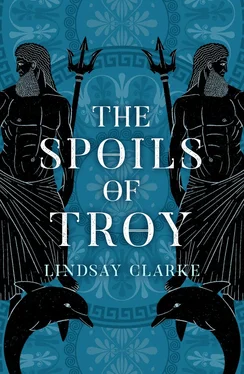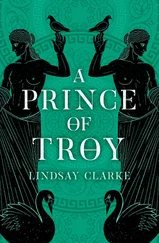‘You are the guest of our house,’ Penelope answered. ‘It shall be as you wish.’
And so, with the only subjects about which people wished to speak thus firmly confined to silence, this awkward meal progressed. Amphinomus did what he could to ease the atmosphere by extolling the contribution that Euboea had made to the art of navigation. In particular he praised that island’s introduction of cliff-top beacons beside dangerous shoals, an invention which had caught on across Argive waters and proved a boon to mariners everywhere.
Nauplius nodded in acknowledgement. He and Amphinomus chatted together for a while. ‘It pleases me,’ he said, ‘to learn that the Lady Penelope has found a diverting companion in her husband’s absence.’ And at the fireside pillar where we sat with the dog Argus stretched between us, kicking his hind-legs in a dream of chase, I saw Telemachus scowl.
Eventually, having eaten well for all his disdain for rustic fare, Nauplius declared himself replete, washed his hands in the bronze bowl and indicated his desire to speak alone with the lady of the house. We watched them leave the hall together, he gaunt and frail, she taller by almost a head, yet they felt worryingly like an executioner and his victim.
‘Come, Phemius,’ Amphinomus called across the hall, ‘sing for us again.’
Not for many years, not indeed till after her husband’s return, did Penelope utter a word about what was said between her and King Nauplius that night. The following morning, shortly after dawn, that disagreeable visitor put out to sea without offering thanks or saying farewell to anyone. No one on the island regretted his departure though we were all troubled by the shadow that he had evidently cast across Penelope’s mind and face, and not even Amphinomus could persuade her to share the burden of her cares.
Not many weeks would pass, of course, before we learned that this was only one of many visits that Nauplius was to make to the chief kingdoms of Argos, and everywhere he went, including, most dramatically, Mycenae itself, he left the contamination of his vengeful grief. And from reports of what happened elsewhere it was not difficult to guess what must have passed between Nauplius and Penelope that night.
Nauplius would have begun by singing the praises of his dead son Palamedes. Was his not the swiftest and most orderly mind in the Argive leadership? Had he not come to the aid of the duller-witted Agamemnon by recommending an order of battle which would take full advantage of the diverse forces assembled under his command rather than allowing their rivalries and customs to weaken their strength and cause disarray? Had he not devised a common signalling system that could be understood and exploited equally well by tribesmen from Arcadia, Crete, Boeotia and Magnesia? Had he not unified the systems of measurement used throughout the host so that there could be no confusion over distances and arguments over the distribution of rations and booty might be kept to a minimum? Wasn’t it Palamedes who had kept the troops in good heart by teaching them his game of dice and stones? Hadn’t he always done what he could to make sure that the voice of the common soldiery was heard among the council of the kings? In short, Nauplius insisted that if it had not been for the presiding intelligence of Palamedes, anticipating difficulties and finding means to overcome them, Agamemnon’s vast army would quickly have degenerated into a quarrelsome rabble with each tribal contingent looking only to its own interests even though the entire campaign might founder on such narrow pride.
Penelope would have listened patiently to all of this. After all, the man was her house-guest and it was understandable that a father’s grief should exaggerate his dead son’s contribution to the arduous effort of a war in which he’d lost his life. She had no doubt, of course, that the intelligence and experience of Odysseus must have played at least an equal part in that effort, and probably a greater one, but she had already sensed that to speak up for her husband at this juncture could only arouse a hostile response from this lugubrious old man. So she preferred to hold her peace and wait to see what menace still lay concealed behind his show of grief.
It was not long in coming. Frowning into space as he spoke, Nauplius told how, late in the previous year, when their supplies began to dwindle and raids along the Phrygian and Thracian coasts produced little by way of grain and stores, the Argive host had been faced with a choice between starving outside the walls of Troy or turning tail with little to show for all those long years of war. Odysseus had been in command of one of the raiding parties that returned with its holds empty. When he was met by the rage of Agamemnon, he publicly defied any man to do better. The harvests had failed everywhere that year, he claimed. The granaries were bare.
‘Palamedes took up the challenge,’ Nauplius said, ‘and when he returned to the camp only a few days later, his ships rode low in the water, heavy with grain. You would have thought he deserved the heartfelt thanks of the entire host, would you not? And the common soldiers were warm enough in their praise. My son had always championed their cause. Now he had saved them from hunger. But with the generals it was a different story.’ Fiercely the old man drew in his breath. ‘Whenever there had been conflict among them as to the most effective course of action, Palamedes was invariably proved right. The high command sometimes paid a high price in blood for ignoring his advice and now, once again, my son had succeeded where others had failed. Their envy turned first to spite and then to malice. At least one of them was determined to blacken his name.’
By now Penelope must already have guessed the direction of Nauplius’s story. She knew very well that Odysseus cared for Palamedes no more than she did herself. But nothing could have prepared her for the charge that Nauplius was about to bring against her husband.
‘My son used to send me frequent reports of the progress of the war,’ he said. ‘After all, I had been one of Agamemnon’s principal backers from the first. To fight this war he needed the wealth of Euboea as well as our ships. Without the huge loans I made him, he could never have mustered half the force he did. And both my son and I were well aware that those loans would not be repaid unless Troy fell. So Palamedes went to the war as the guardian of my investment. I relied on him to make sure that the campaign was effectively pursued. I relied on him for news. When he fell silent I began to suspect that something untoward had happened.’ After a grim silence Nauplius said, ‘I sent urgent messages to the Atreides brothers. When no word came back I decided to sail for Phrygia myself.’
After a deliberate silence Penelope asked, ‘And what did you learn there?’
‘I learned that my son had been dead for some time. But he had been denied an honourable death in battle. Palamedes had been traduced by men he took to be his friends. Envious men. Men who worked in darkness to do him harm. A conspiracy of lies had been mounted against him. He was accused of treason. Evidence was fabricated. It purported to show that he had taken Trojan bribes. He was tried and found guilty by the very men who had perpetrated this foul calumny. Palamedes, always the most prudent and honourable of men, met a traitor’s end. He was stoned to death by the host he had sought to serve to the very best of his ability.’ Nauplius was shaking as he spoke. His lips quivered but his eyes were dry as in a hoarse whisper he said, ‘My son’s last words were, “Truth, I mourn for you, who have predeceased me.”’
The words lay heavily on the silence for a time. They could hear the sound of men carousing in the hall below. Eventually Penelope raised her eyes. ‘You are impugning the honour of Agamemnon and Menelaus?’ she demanded.
Читать дальше












